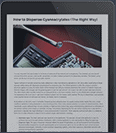How to Bond Materials
At first glance, bonding two surfaces may seem straightforward. However, the choice of adhesive is critical, as it must be formulated to work with the substrates and meet performance requirements. Failure to select the appropriate adhesive can result in an unreliable connection, potentially leading to structural failure. Let’s discuss what adhesive bonding is, how cyanoacrylate adhesives work, and how materials can be bonded with them.
What is Adhesive Bonding?
Adhesive bonding involves joining two surfaces together to form a seamless bond. The bond is achieved by applying glue, epoxy, or other plastic adhesives to one or both surfaces. In some cases, a piece of adhesive tape with a two-sided coating can be placed between surfaces to bond them. The bond forms by solvent evaporation, by a curing process with applied heat or pressure, or simply by curing over a period of time.
Glues and adhesives form bonds of varying strengths. New and advanced self-curing glues have been developed that can create bonds as strong as, or stronger than, the materials they join. High-strength glues and adhesives are a common choice in many manufacturing, industrial, and household uses as a result.
Depending on the formulation, some adhesives and glues must be remixed prior to application to distribute ingredients. Others, such as two-part epoxies, must not be mixed until they are ready to be used. Some glues must be cured by applying heat or UV radiation, while others cure in the open air over a period of time. Our focus here will be cyanoacrylate glues, which do not require mixing, set quickly, and cure by atmospheric moisture (humidity) and latent moisture on the bonding substrate surface. This is called an anionic bond or anionic polymerization causing the cyanoacrylate monomer to transition to a polymer bonding materials together.
How Do Cyanoacrylate Adhesives Work?
Cyanoacrylate, often referred to as an instant adhesive, CA glue, or super glue, is a liquid acryl monomer that achieves a fixture time in seconds. Over a period of hours, the glue cures completely for a high-strength, permanent bond.
When placed between two surfaces, cyanoacrylate reacts instantly, forming polymer chain bonds as soon as it is exposed to residual moisture on the substrate surfaces. As a single-part adhesive, it does not require mixing and there is no need for heat or UV light to cure it.
In some applications in which the adhesive is exposed instead of being sandwiched between two surfaces, curing can be delayed. In these cases, a liquid activator may be sprayed on the glue to help it harden. These activators are also used in applications where one or both of the surfaces to be bonded is very dry, acidic, or porous.
Bonding Materials with Cyanoacrylate
Many materials can be bonded successfully with cyanoacrylate adhesive including ceramic, rubber, elastomers, textiles, metal, wood, and plastic. All-purpose, standard formula cyanoacrylates work well in many situations; however, they can also be formulated to enhance characteristics for specialized applications. Examples include:
- Impact resistance
- Thermal resistance
- Peel resistance
- Rigid or flexible curing
- Water resistance
- Low odor
- Low bloom
- Specific substrates (e.g., soft/flexible, metal, plated material, porous material)
- Ultra-fast set time
- Extra clear when cured
- Thixotropic, no-run formula
Some materials are more challenging to bond. These may include very dry or acidic substrates; polyolefin, acetal, and fluoropolymers; or low surface energy plastics such as polypropylene and polyethylene. Surface treatment primers and adhesive accelerators are available to prepare them and improve adhesive performance.
Use Aron Alpha Adhesives for Your Application
Adhesive bonding is a common, efficient, and effective process in manufacturing, medical applications, and household settings. Aron Alpha is a leader in cyanoacrylate innovations, helping to improve productivity and product quality for its customers.
We offer a range of instant adhesive formulas, primers, and accelerators, as well as custom formulations to meet your specific requirements. Lab testing, on-site consultation, and prototype testing services are also available.
Contact us to learn more about our line of adhesives or request a quote.





